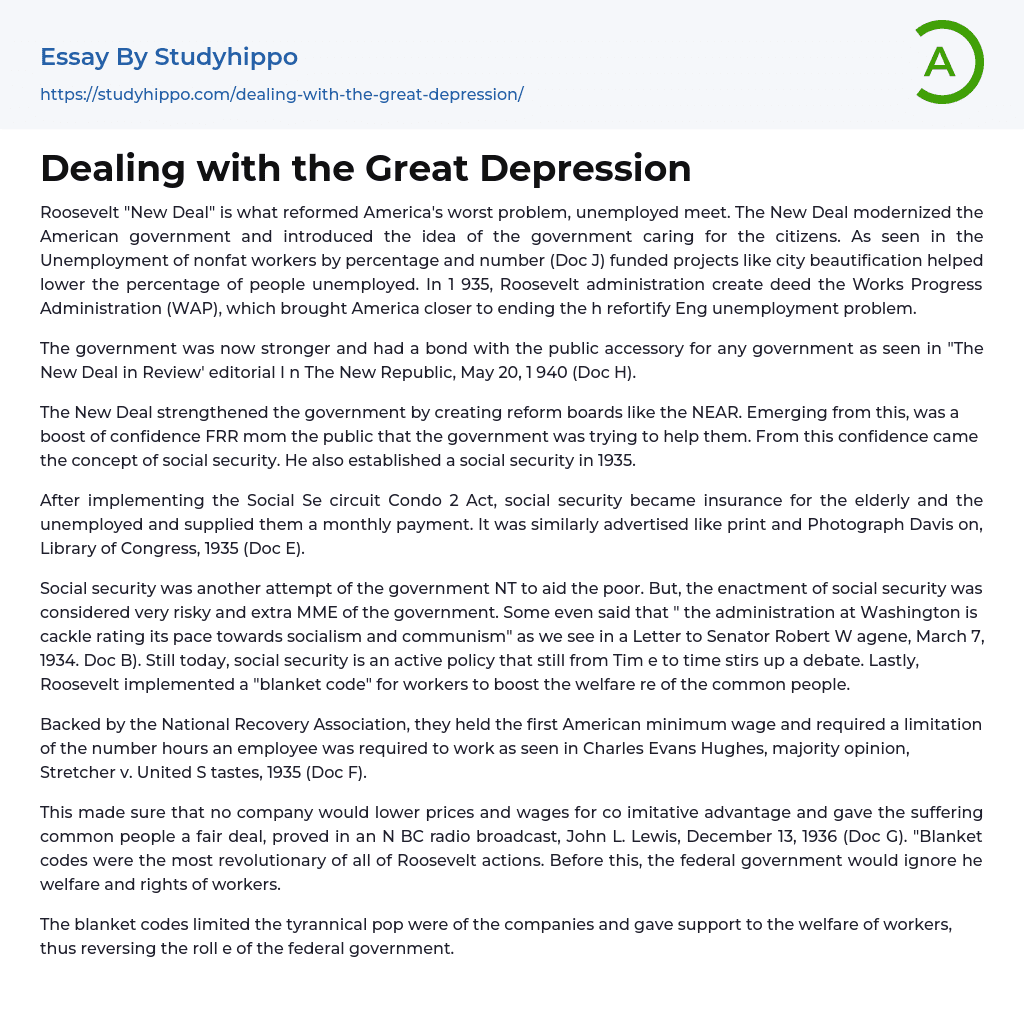Roosevelt "New Deal" is what reformed America's worst problem, unemployed meet. The New Deal modernized the American government and introduced the idea of the government caring for the citizens. As seen in the Unemployment of nonfat workers by percentage and number (Doc J) funded projects like city beautification helped lower the percentage of people unemployed. In 1 935, Roosevelt administration create deed the Works Progress Administration (WAP), which brought America closer to ending the h refortify Eng unemployment problem.
The government was now stronger and had a bond with the public accessory for any government as seen in "The New Deal in Review' editorial I n The New Republic, May 20, 1 940 (Doc H).
The New Deal strengthened the government by creating reform boards like the NEAR. Emerging from this,
...was a boost of confidence FRR mom the public that the government was trying to help them. From this confidence came the concept of social security. He also established a social security in 1935.
After implementing the Social Se circuit Condo 2 Act, social security became insurance for the elderly and the unemployed and supplied them a monthly payment. It was similarly advertised like print and Photograph Davis on, Library of Congress, 1935 (Doc E).
Social security was another attempt of the government NT to aid the poor. But, the enactment of social security was considered very risky and extra MME of the government. Some even said that " the administration at Washington is cackle rating its pace towards socialism and communism" as we see in a Letter to Senator Robert W agene, March 7, 1934. Doc B). Still today, social security is
an active policy that still from Tim e to time stirs up a debate. Lastly, Roosevelt implemented a "blanket code" for workers to boost the welfare re of the common people.
Backed by the National Recovery Association, they held the first American minimum wage and required a limitation of the number hours an employee was required to work as seen in Charles Evans Hughes, majority opinion, Stretcher v. United S tastes, 1935 (Doc F).
This made sure that no company would lower prices and wages for co imitative advantage and gave the suffering common people a fair deal, proved in an N BC radio broadcast, John L. Lewis, December 13, 1936 (Doc G). "Blanket codes were the most revolutionary of all of Roosevelt actions. Before this, the federal government would ignore he welfare and rights of workers.
The blanket codes limited the tyrannical pop were of the companies and gave support to the welfare of workers, thus reversing the roll e of the federal government.
- Abraham Lincoln essays
- Andrew Jackson essays
- Barack Obama essays
- Bill Clinton essays
- Donald Trump essays
- Franklin D. Roosevelt essays
- George W. Bush essays
- George Washington essays
- James Madison essays
- John F. Kennedy essays
- Lyndon B. Johnson essays
- Richard Nixon essays
- Theodore Roosevelt essays
- Thomas Jefferson essays
- Vice President essays
- Abolitionism essays
- Adam Smith essays
- American History essays
- American Revolution essays
- Ancient Egypt essays
- Articles Of Confederation essays
- Atlantic Slave Trade essays
- Aztec essays
- Benjamin Franklin essays
- Civil Rights Act of 1964 essays
- Civil Rights Movement essays
- Civil war essays
- Cleopatra essays
- French And Indian War essays
- Gettysburg essays
- Great Depression essays
- Hurricane Katrina essays
- Industrial Revolution essays
- Jamestown essays
- Manifest Destiny essays
- Mccarthyism essays
- Patrick Henry essays
- Pearl Harbor essays
- Pocahontas essays
- Prohibition essays
- Pyramids essays
- Salem Witch Trials essays
- Slavery essays
- The New Deal essays
- Thirteen Colonies essays
- Westward Expansion essays
- American Dream essays
- Barriers To Entry essays
- Capitalism essays
- Central Bank essays




